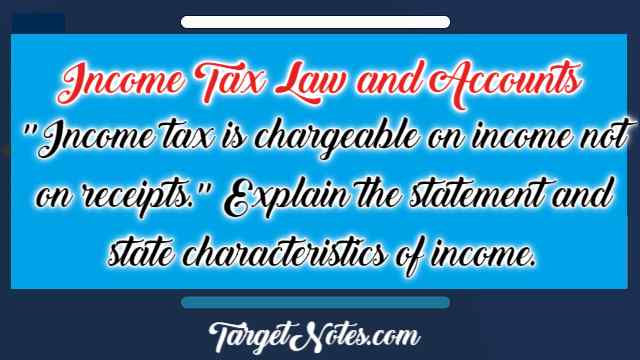
Contents
Income tax is chargeable on income not on receipts
According to Sec. 4 of the Income tax Act, 1961 income tax shall be chargeable in the assessment year in respect of total income of the previous year of every person.
Hence it is very clear that income tax is charged on income.
However, some provisions of the Income tax Act provide that income will be chargeable on receipt basis but this does not mean that the chargeability of tax shifted towards recipient.
Due to the very reason following receipts are not chargeable to income tax:
1. Receipts in the form of personal gifts.
2. Receipts of money which had been charged to tax earlier.
3. Receipts on account of Dharmada, Gaushala, Pathshala etc.
4. Awards received by non professional sportsman etc.
Characteristics or Principles –Following are guiding factors which are useful while classifying any receipt as income:
1. There should be a regular and definite source of income. But it is not mandatory.
2. Income may be received in cash or kind.
3. Income may arise on receipt basis (cash basis) or on accrual basis (mercantile basis). Even in some cases income may be deemed to be received without actual receipt.
4. Income may be vitiated with illegality. Income tax is equally chargeable on illegal income.
5. Reimbursement of expenses or relief is not treated as income.
6. The source of income must be outside. Hence, profit earned from mutual activities is not income e.g. withdrawal of goods by an individual businessman from stock of shop.
7. Income may be received in lump sum or in instalments.
8. Personal gifts are not income. 9. Income may be positive (profits) or negative (loss).
10. Same income cannot be taxed twice in any case.
11. Income should be real and not imaginary e.g. profits charged by departments for services or production in a company are not real but fictitious.
12. For the purpose of taxability, source of income may not exist in assessment year.
The thumb rule in respect of chargeability of income is:
A revenue receipt is chargeable to tax as income unless specifically exempted under the Act.
A capital receipt is generally exempted from tax unless expressly taxable.
Due to the very wide scope of income Lord Russell in case of Gopal Saran Narain Singh vs. CIT (1935) said that “anything which can properly be discribed as income is taxable under the Act unless expressly exempted.” Hence no hard and fast rule can be prescribed but ‘income’ has to be decided considering facts of each case.
- Meaning and Types of commercial risks
- How can we minimize foreign trade risks?
- What are Arbitrage operations?
- Difference between Spot Market and Forward Market
- What is spot exchange?
- Agency agreement: Meaning, Features and Advantages
- Functions of Foreign Exchange markets
- structure of Foreign exchange markets
- Stability of Exchange Rate- Facts, significance, method, theories & warning
- Main Items Debit and Credit sides of the Balance of Payment
- Differences between Educational Administration and General Administration
- General Administration and Educational Administration
- Nature of Educational Administration
- Scope of School Administration
- Definitions of Educational Administration by Different Scholars
- Definitions of Educational Administration by Different Scholars
- Meaning of Educational Administration
- Principles of School Organisation and Administration
- Aims and Objectives of School Organisation
- School Organisation | Meaning of School Organisation | Meaning of School |Meaning of Organisation
Disclaimer






